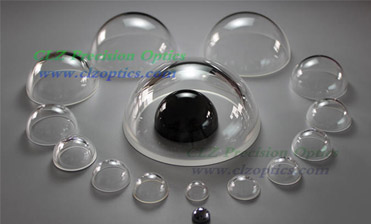What are the Factors that Affect the Cleaning of Optical Glass Lenses?
Optical Glass Lenses are mixed with high-purity silicon, boron, sodium, potassium, zinc, lead, magnesium, calcium, barium and other oxides according to a specific formula, melted in a platinum crucible at high temperature, stirred with ultrasound to remove bubbles; Slowly cool down for a long time to avoid internal stress in the glass block. After cooling, the glass block must be measured by optical instruments to check whether the purity, transparency, uniformity, refractive index and dispersion rate meet the specifications.
In order to produce high-quality optical glass, it must undergo cold processing, polishing, cleaning, and other processes before obtaining high-quality optical glass lenses. Below Optical Glass Domes Factory mainly talks about the cleaning process of optical glass.
Optical Glass Lenses
What are the factors that affect the cleaning of optical glass? Let's take a closer look:
A, the technical key of the cleaning process: whether the optical glass can reach the surface after cleaning without any oil stains, smudges, smooth surfaces, and intact water film!
B. Factors affecting the quality of optical glass after cleaning and corresponding solutions:
(1) The quality of the glass screw feeder and the contaminated conditions are mainly: the surface has mildew points, bubbles, scratches, etc. In mechanical processing, such as: grinding, testing, stress measurement, man-made pollution Different situations
(2) Selection of cleaning agent: its activity, temperature, and water quality; we use non-ODS water-based alkaline cleaning agents, which are mainly composed of water, alkali, surfactants, and rust-proof materials. The chemical formula is C3H8. Olefins have strong oil-solubility; characteristics: low toxicity, non-combustibility, low cleaning costs, etc.
(3) The concentration of the solution directly affects the degree of cleaning; usually the pH value of the cleaning solution is generally between 8.5-12. If the pH value is greater than the box transformer station 10, the role of the side surface active substances will be weakened. When the pH value is greater than At 12 o'clock, the side cleanliness decreases.
(4) The temperature and soaking time of the solution also affect the decontamination efficiency like a high-temperature circulating fan; when the temperature rises, the reaction speed of the solution also rises, the viscosity of the pollutants decreases, and the pollutants are detached, but the stability of the solution decreases. If the temperature is too high, patterns will be created on the corners of the glass.
(5) In the cleaning process, you should also pay attention to the use of pure water or deionized water. If you use hard water such as tap water, it is difficult to remove the oil on the glass, and the impurities such as Ca and Na ions contained in the water will be dried after drying. A white misty film forms on the surface of the glass, contaminating the glass;
(6) The optical glass needs to be rinsed after cleaning. The cleanliness after rinsing is not only related to the rinsing ability of the cleaning agent and the concentration of the cleaning agent in the cleaning solution, but also to the number of rinsing processes, the size of the rinsing water supply, the temperature and Whether the recycled pure water is clean;
(7) the cleanliness of the cleaning environment;
Our company also sells Plano Concave Lenses China, welcome to consult.

评论
发表评论